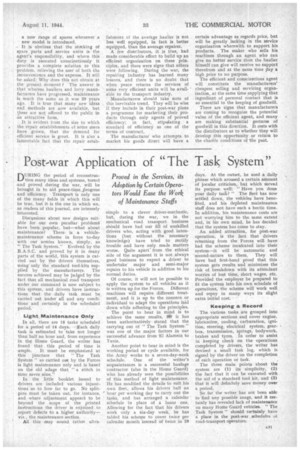Post-war Application of "The Task System"
Page 33

If you've noticed an error in this article please click here to report it so we can fix it.
Proved in the Services, its Adoption by Certain Operators Would Ease the Work of Maintenance Staffs
nURING the period of reconstruc
tion many ideas and systems, tested -and proved during the war, will be brought in to aid peace-time. .Progress and efficiency. Transport is only one of the many fields in which this will be true, but it is the one in which we, as readers of this journal, are intensely interested.
Discussions about new designs suitable for our own peculiar problem have been popular, but—what about maintenance? There is a vehiclemaintenance scheme in force to-day with our armies known, simply, as "The Task System." Evolved by the R.A.S.C. and proved by it in many parts of the world, this system is carried out by the drivers themselves. using only the standard tool-kits supplied by the manufacturers. The success achieved may be judged by the fact that all mechanical road transport under our command is now subject to this system, and drivers have instructions that the daily task must be carried out under all and any conditions and certainly in the scheduled period.
Light, Maintenance Only In all, there are 16 tasks scheduled for a period of 14 days. Each daily task is estimated to take not longer than half an hour and, from experience in the Home Guard, the writer has found that this period of time is ample. It must be emphasized at this juncture that " The Task System " as carried out by the Forces is light maintenance only and is based on the old adage that " a stitch in time saves nine."
In the little booklet issued to drivers are included various injunctions as to how far to go. No splitpins must be taken out, for instance, and where adjustment appearg to be beyond the scope of the printed instructions the driver is enjoined to report defects to a higher authority— viz., the maintenance section.
All this may sound rather ultra.
simple to a clever driver-mechanic, but, during the war, we in the mechanical road transport business should have had our fill of unskilled drivers who, acting with good intentions (but without the necessary knowledge) have tried to rectify trouble and have only made matters worse. Quite apart' from the ethical side of the argument it is not always good business to expect a driver to undertake major and semi-major repairs to his vehicle in addition to his normal duties.
Of course, it will not be possible to apply the system to all vehicles as it is written up for the Forces. Different machines will require different treatment, and it is up to the concern or individual to adapt the operations laid down while adhering to the principles.
The point to bear in mind is to achieve the same results. M. it has been authoritatively stated that the carrying out of " The Task System " was one of the major factors in our successful advance from El Alamein to Tunis.
Another point to bear in mind is the working period or cycle available, for the Army works to a seven-day-week schedule. One of the writer's acquaintances is a successful haulage contractor (also in the Home Guard) who has already seen the possibilities of this method of light maintenance. He has modified the details to suit his own fleet, allows his drivers half an ' hour per working day to carry out the tasks, and has arranged a calendar schedule in place of a lunar one. Allowing for the fact that his drivers work only a six-day week, he has tabled his scheme to cover twice per calendar month instead of twice in 28
days. At the outset, he used a daily phrase which aroused a certain amount of jocular criticism, but which served its purpose well: " Have you done your daily task? " The fleet has now settled down, the vehicles have benefited, and his depleted maintenance staff does not have such a hectic time. In addition, his maintenance costs are not worrying him to the same extent and, in his own mind, he has decided that the system has come to stay.
An added attraction, for post-war operation, is the fact that drivers returning from the Forces will have had the scheme inculcated into their system—it will be automatic and second-nature to them. They will have had first-hand proof that this system gets results and minimizes the risk of breakdown with its attendant worries of lost time, short wages, etc. Provided the employer be prepared to fit the system into his own schedule of operations, the scheme will work well and repay in many ways its slight extra initial cost.
Keeping a Record The various tasks are grouped into appropriate sections and cover engine. lubrication, cooling, carburation, ignition, steering, electrical system, gearbox, transmission, springs, bodywork, brakes and tyres. In order to assist in keeping check on the operations completed by drivers, the writer has devised a small task log, which is signed by the driver on the completion of each operation or task.
The three main points about the system are (1) its simplicity. (2) the fact that it can be executed with the aid of a standard tool kit, and (3) that it will definitely save money over a period. So far the writer has not been able to find any possible snags, and it eeltainly has revealed lack of maintenance on many Home Guard vehicles. " The Task System " should certainly have a place in the post-war schedules ,.11 road-transport operators.




















































